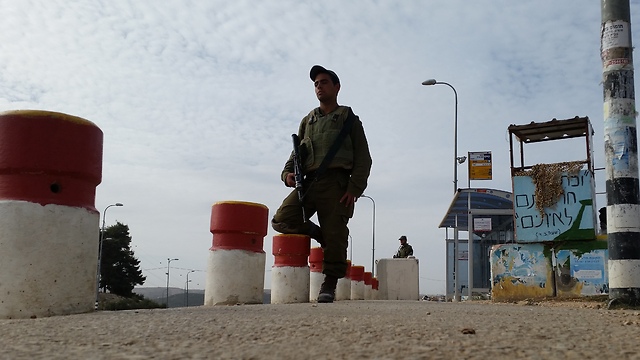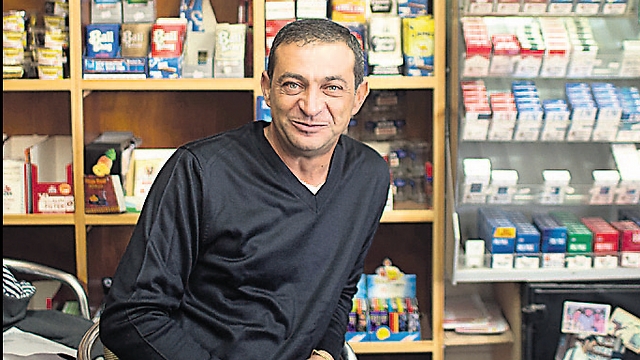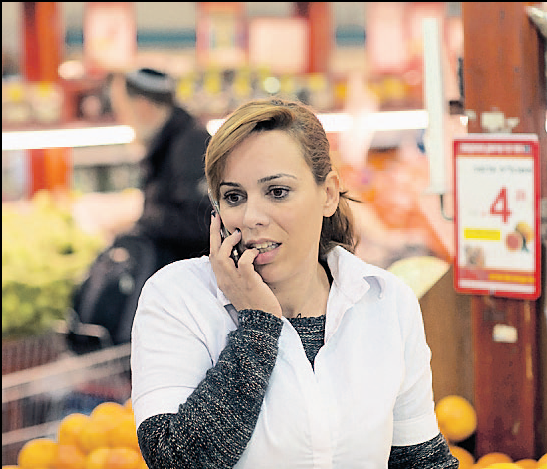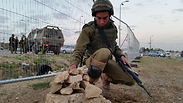
Gush Etzion's deadly junction
Over the past few weeks, the Gush Etzion junction has turned from a thriving commercial center into a repeated target for terror attacks. Nearly all of the business owners have witnessed at least one. But still, they struggle to maintain coexistence in the area.
From Baruch Nahum's lottery stand, the Gush Etzion junction looks like a secure military base with police vehicles slowly crossing it. Tall iron fences run along the length of the road behind the hitchhiking stations where civilians stand. The fences were introduced two weeks ago, after two terrorists arrived at the junction on foot and tried to stab soldiers. Now it's impossible to enter the junction just like that – instead, one must go through specific points that are supervised by soldiers.
The front of the hitchhiking station is separated from the road by concrete barriers. The barriers were also brought here after an attempted attack, this time vehicular. When we went there on Tuesday this week we counted four soldiers at each hitchhiking station – and one on every side of the junction. Their heads were helmeted, they wore bullet-proof vests, and had weapons with the cartridges loaded, their fingers on the trigger, each one watching the other's back.
A police jeep guarded the square at the center of the junction. The police looked nervously in all directions. On the southwestern side of the junction stood a pillbox, with two soldiers inside it observing traffic approaching the junction from the north and from the south. Inside the junction itself was a group of six soldiers who looked ready to spring into immediate action. This is how things at the junction looked at a not-particularly-early hour of the morning, and on the lampposts and other posts we counted no less than 12 cameras monitoring every square meter of the place.
Nahum, 45, a resident of the Gilo neighborhood in East Jerusalem, sees everything from his chair behind the sales counter. He saw the vehicular attack on October 20 when he stepped out for a breath of fresh air.
"I looked at the road and suddenly - boom, a pick-up truck goes into the hitchhiking station and tosses two people into the air," Nahum recalls. "The terrorist, the driver, got out with a knife and soldiers ran straight over to him and shot him. They took him down right in front of me. One moment, I need to answer the telephone... 'Hello, sabah el-khair…('good morning in Arabic')…"
What was that?
A client of mine from Hebron who buys lottery tickets from me. He called to ask if his numbers had by any chance come up."
Did they?
"Of course not. But here's the thing, look how afraid everyone is now, the Arabs too. This guy is a regular client of mine, he comes two or three times a week, but now he's afraid to come here. Because of the situation, every Arab is suspicious now. 'Hands up, lift up your shirt, take down your pants.' They feel humiliated. Most of my clientele is Arabs from Hebron, Bethlehem and villages in the area. They invite me to their parties. Before this mess I was at a massive celebration in Halhul. It was great.
"But with the way things are today I wouldn't go, because it's impossible to know where it's going to hit you from. I've seen from this spot almost all the attacks that have taken place here. It's the most explosive place in the country right now. They're stabbing us, running us over, shooting. Is it any wonder there aren't more people coming to my shop? There's the fear of God here. How long have you been here, more than an hour? What have I sold? Nothing!"
Closing the cash register with nothing
It's not for nothing that the head of the Gush Etzion Regional Council, Davidi Perel, would later tell us that the junction is the center of life in the area. Highway 60 crosses it and runs between Jerusalem and Hebron, Kiryat Arba and goes south in both directions. Highway 367 arrives here from the Judean plains and cuts across the east of the junction to Herodion, Nokdim and Tekoa. Everyone passes through the junction on a daily basis - Palestinians and Jews. But it's not just a thoroughfare – it's also a center of commerce with food shops, clothes shops, garages, shoe shops, garden centers. It's a beating heart of shopping as well as relaxing with a coffee and a pastry. And every business owner here has, during the last two months of stabbings and vehicular attacks, been hiding behind their counters or at the business of their neighbor, with bullets whizzing past their ears.
Hadar Buchris, 21, was stabbed to death here on Sunday, and a little pile of stones is the only testimony to the murder. Another ring of stones at the side of the road, 200 meters from here, commemorates the attack at the junction three days prior to that, in which Ezra Schwartz, Yaakov Don and Shadi Arafa were shot to death. When you linger at a spot, someone will say to you, "here, right where we're standing, there was an attack."
We started at a container that Orly Baron, from Efrat, turned into a small and charming women's clothes store. Before that she had a clothes shop in Efrat, which she then moved to Jerusalem. The store in Jerusalem folded due to the high rent.
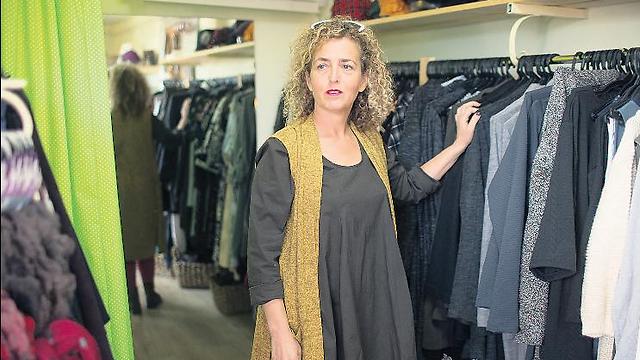
"I opened up here four months ago, because it's the center of everything in this area. Look what a great place it is. I set up a table and bench outside so that business owners can wait here and relax," says Baron. "The store very quickly became a friendly spot to meet and have coffee. Two months went fantastically, but then the first attack at the junction happened and I immediately organized a Shabbat event in my store to raise morale. It was great, people came to give and receive strength, but afterwards there was another attack and another and another and the shopping went down to almost nothing.
"These days I'm selling maybe a tenth of what I was selling up until Sukkot. The feeling of fear is also unpleasant. There was a vehicular attack right here when I was standing outside my shop, right opposite, look how close it is. I saw the soldier shoot the terrorist. On the other side of the terrorist's car a young guy who'd been run over was lying on the ground, and only after that did I realize that it was a good friend of my eldest son, a child who was part of the family."
Did you see the attack that killed Hadar Buchris?
"You won't believe it. I was in Tel Aviv, I went to collect merchandise. At around half-past four, my sons started calling me. When they call it's a sign that there's been an attack at the junction. I told them that everything is fine, that the shop is closed and that I'm actually in Tel Aviv. They're always saying to me, 'you're not normal, do you intend to keep working there?' And I always reply, 'of course, why would I leave?'
Anyway, after I was finished telling everybody that I was okay, I decided to go and relax with a coffee on Sheinkin St. The moment I got into the street I saw two religious teenage girls and one of them was screaming into her phone, saying ‘just tell me what happened, just tell me what happened.’ They were really helpless. I went towards them, brought them some water from a nearby coffee shop, sat them down and tried to calm them. And what turns out to have happened? The girl who spoke on the phone, crying, was the sister of the girl who was murdered here at the junction a short time ago.”
After visiting Baron's store, we entered Etgar Bicycles, the bike shop belonging to Elazar Faber from Tekoa. He witnessed the same vehicular attack that Baron did, in his case from the roof of the store he was building. “I heard the vehicle crash into people and the concrete barrier, and the gunfire, and Orly shouting, and I jumped to get cover,” he says.
Faber is 24, recently married, and opened his shop just three weeks ago. “I invested tens of thousands of shekels in this place,” he says. “There are a lot of bicycle riders in the area, and I was certain that the moment I opened up, the business would get running and thrive. The only thing I took into account is the winter, which is not as good a season in this business. But I didn’t consider the security situation at all. In fact, a day before the opening there was a vehicular attack right in front of here, and since then things have only gotten worse. There are days where I just sit here and try to convince myself that I didn’t make a mistake in opening the store, days when I close the cash register with nothing."
Faber is currently trying to attract customers with price reductions and sales. Yaakov Kimai, 26, a resident of Gilo who opened a shoe store six months ago, is also cutting prices by significant percentages, “and still, people barely come,” he says. “My brother and I came here because we heard that this place was steaming hot. That there wasn’t one person who didn’t stop here to shop. We were on fire here. A customer would enter and wait 40 minutes for someone to come over to him."
“But suddenly I found myself running to hide under the counter each time. You wouldn’t believe what goes on here. It's Chicago: knives, gunshots, terrifying. And by the way, this is the most dangerous time of day, most attacks happened in the afternoon. If I were you I wouldn’t walk around here casually like it was Tel Aviv, don’t get cocky.”
But Nahum from the nearby kiosk isn’t scared. When his son, 27-year-old Ohad, who runs the gardening nursery adjacent to the kiosk (the Gush Etzion Gardening Nursery), tells us how the bullets fired by the terrorist last week whizzed past the nursery’s greenhouse and how he lay down on the ground scared, Nahum just listens with a slight smile on his face.
“I was born in Aleppo, Syria,” Nahum says, “and escaped there when I was 20 with two Jewish friends in an operation my friend, Avi, planned on his own. An operation which was on the level of the best organizations out there. In order to get over the fear, we each drank a small arak (a type of Levantine alcoholic spirit) bottle. We reached the Syrian-Turkish border area at night, and climbed a huge mountain full of spikes and rocks on foot, and when we came down we saw a jeep belonging to the Syrian border patrol. We sneaked behind it and ran five kilometers without stopping, like tigers, to the Turkish border. And there we were caught by an ambush of Turkish soldiers who laid us on the ground with guns pointed at our heads. So why should I be afraid?”
How did you come to be at this junction?
“I had a kiosk in Katamon (a Jerusalem neighborhood), and I heard that this was a great place. Most of the work here is with Arabs, and Arabic is my mother tongue. It’s a place that two months ago, if you came, I couldn’t talk with you for a second. What’s going on now is crazy. The guy who murdered the girl here looked like he was normal. I spoke to his friends from Beit Fajjar. I have clients from there, and they don’t understand this insanity either. They say he was a totally normal guy. So you can’t know.
“If an Arab comes in here I greet them in Arabic, with a ‘sabah al-khair,’ ‘marhaba,’ a ‘masaa al-khair’ (good morning, hello, and good evening in Arabic, respectively). I have an Arabic accent and I’ve adjusted my slang to the Palestinian slang, so that if a terrorist comes in I’ll confuse him, make him think I was an Arab, and he won’t do anything to me. But forget about it, I heard they closed the walking entryways into the junction today, so business is gone.”
Ohad says that each day, when he comes here from his home in Gilo, he trembles with fear. Besides selling potted plants, trees, and work tools, he also does work on private home gardens. “But now there isn’t any work in that either," he says, “because Palestinian workers can’t enter Jewish towns in the area until further notice. Now I’m stuck with two jobs in Efrat which I can’t do because my workers are Arab.”
'We come here because of Salman'
The day after Hadar Buchris’ murder, the military announced that it won’t allow Palestinians entry into the junction’s shopping center, even for those who work there. But when we came there this week, we saw that all of the businesses have Palestinians who continue to work there. The Rami Levy supermarket had Arab cashiers working alongside religious Jewish ones, and the butchers in the meat department were Arabs as well. Two armed security guards stood at the entrance to the store, and another was patrolling it inside.
The branch manager, Rinat Sulimani, says that they carefully maintain coexistence. Around 120 people work here, of whom only 40 are Jewish. All of the rest are Palestinians with work permits. “I don’t feel tension in the branch,” she says. “Not between the customers and employees and not between Jewish and Arab employees. Here, just now an employee showed me photos of a wedding her family had in Bethlehem.”
Doesn’t it bother the customers?
“There might be some who are bothered by it, but no one has come and spoken to me about it. On the other hand, there are customers who tell us 'well done, keep employing Arabs, it’s especially important now.' One of the Arab cashiers told me that a customer from Kiryat Arba told her that a group of residents from the area are gathering to petition the military to disallow employment of Arabs in the junction, except for at Rami Levy ‘because here it’s pleasant and the Arab employees are nice.’ We have a guy at the cheese section, a Palestinian guy names Salman, and customers specifically tell me, ‘we come here because of Salman.’”
But then we exited Rami Levy and circled the complex until we reached a new structure where a Shufersal (another large chain of Israeli supermarkets) branch is supposed to open next week. If over half of the Rami Levy employees are Palestinian, the new Shufersal branch will only have two Arab employees, Israeli Arabs from East Jerusalem. All of the rest will be Jewish.
The branch’s manager, Rami Kaminski, says that it has nothing to do with the security situation. “The decision is due to convenience factors only. It’s more convenient for me to recruit Gush Etzion and Kiryat Arba employees and work with Jews. It’s not that Shufersal told me to only hire Jews. They didn’t limit me,” he says.
The next morning, we came back to the junction and met Rami Levy himself, walking around with a cell phone that looked like it was from the late 90s. “Customers contacted me to make sure we preserved the coexistence and keep employing Palestinians,” he says. “We won’t let the vile murderers win. The terrorists’ goal is that we leave here. That won’t happen.”
Besides the new Shufersal branch, everybody here employs Arabs. At the Gush garage, not far from Rami Levy, they employ 30 Palestinian workers. A woman was stabbed here on October 28, but Smadar Verber, the business’s collections manager, says, “There’s a total dissonance between the atmosphere outside and the atmosphere here, inside the garage. We have Palestinian workers who’ve been here 10 or 20 years, and we’re all like family."
Nitshiya Ferver, wife of Alon, the garage owner, says that the strict security restrictions are making it harder for the workers to get to work. “They say ‘why do they suspect us of being terrorists? We’ve worked here for years.’ They’re also afraid to walk around here. They’re told that any Arab in the junction is shot, that it only takes a slight unclear movement to get you shot. But that’s the situation at the moment and it’s important to us that they go on working here. It’s the place’s character.”
The garage’s body work manager, Yuval Weisman, also a Gush Etzion resident, summarizes: “We understood yesterday that they wouldn’t allow workers to enter the complex in the near future, and we made great efforts to change that decision, talking to security officials. We stood on our hind legs so that they could enter. If they take the Palestinian workers out of the junction then all of the businesses here will shut down.”
Falafel and love
A moment before we said goodbye, a young man sat down in the garage’s office. Roi Pivko, the friend of Orly Baron’s son, was lightly wounded in the vehicular attack in the junction on October 20. He’s 21, works as a driver at the garage, and has the wild hairdo of a person who recently got discharged from the IDF. “I got off work at 4pm,” he says, “and walked to the hitchhiking station at the junction, heading toward Efrat. I have an image in my head of people yelling at me, and then I felt a very strong hit in the back. I don’t remember any more than that of the event. At the hospital, they told me I had a concussion.”
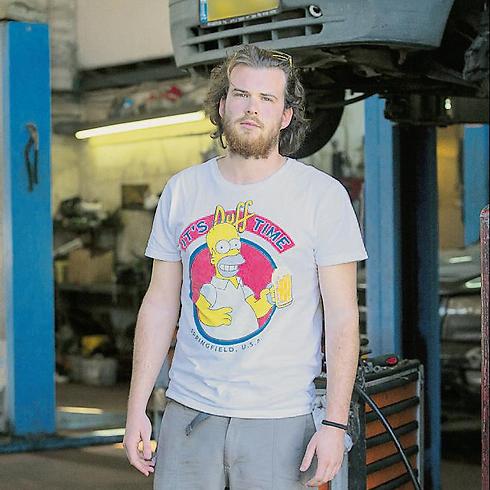
Roi was released from the Hadassah Medical Center in Jerusalem that same day, and went back to work within two weeks. “Now I’m dealing with some post-trauma. Noises make me jump and I look back a lot. Other than that – nothing. I come here with fears, but I come. I was in the garage during the shooting attack on Thursday, I heard the bursts fired by the terrorist. One of the victims, Rabbi Yaakov Don, was my teacher in high school in Efrat. On Sunday as well, when the girl was murdered here, I was present and heard everything. Before what happened to me I wasn’t worried at all, I didn’t think about it. Now I’m more aware of what goes on here.”
Is that the only thing that’s different? Awareness?
“I also stopped hitchhiking and riding in buses. I plan on buying a vehivle in a day or two.”
An hour later, at a gas station on Highway 443, we counted four soldiers and two more military police officers walking around bored. Two guards from the Defense Department were securing the repairs on a nearby fence. It’s a gas station that’s on the main road, about five kilometers from the Maccabim checkpoint. About two kilometers east of here, at the Beit Or checkpoint - nicknamed the "Belle" checkpoint - a soldier was stabbed in the back last August. A week earlier a young man was stabbed at the gas station itself.
Since then, the road has seen stone and Molotov cocktail throwing on several occasions. On Monday this week, 18-year-old Ziv Mizrahi was murdered at the gas station. The murder occurred outside the Falafel Avi eatery, across from the gas pumps and convenience store.
The Super Khawaja convenience store belongs to the Khawaja Fuels group, whose offices are located on the second floor above the store. It’s a fancy office complex with a thick door and surveillance camera on the outside. The employees inside refused to talk. The company belongs to the Khawaja family from Ni’lin. They own gas stations in the territories and commerce areas. Another area of the group’s business is importing cement to the Palestinian territories. It’s a large, established company, which sits here on the main road, at a gas station that has become a terror attack scene.
For nearly two hours we walked around the station, and very few people stopped to fill up. Most were Arabs. Avi from Falafel Avi asked us to leave him be. At the back of the station, in a tiny room, we found Abed Asmar from Ramallah, who has a small laundry business here. “You’re the first people to come in here today,” he said. We went back to the falafel spot and found Iren Adika from Har Gilo, who said, “I stopped here intentionally because it’s a Jewish person’s business that needs strengthening, especially at this time. So I came to eat falafel and support him at the same time.”
Due to security conditions, the Gush Etzion Regional Council came out with a campaign to boost economic activity in the region, which includes a brochure detailing the region’s benefits and coupons for local businesses. On Friday, a regional sales fair was set to take place, organized by the councils of Gush Etzion, Kiryat Arba, Efrat, and Har Hebron. Perel, the head of the Gush Etzion council, says that the challenge is keeping life and the routine going. “Israeli society has proven it knows how to step up and give aid where it’s most critically needed time and again,” he says. “That was the case when business owners in Sderot and towns on the Gaza border were in trouble, and people from all around Israel came to buy and help. I believe that will be the case now as well, and thousands will come from all around Israel to buy here.”










